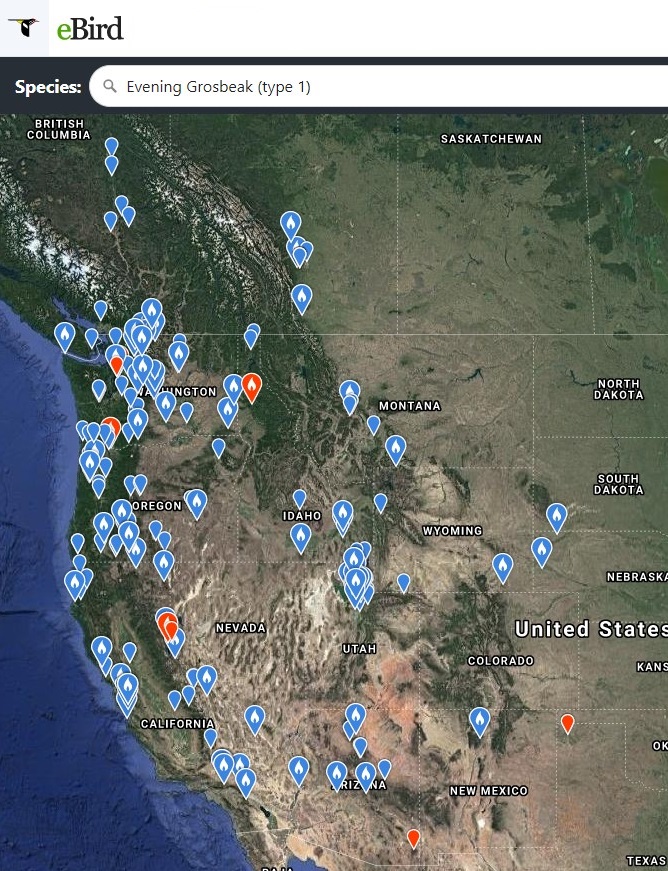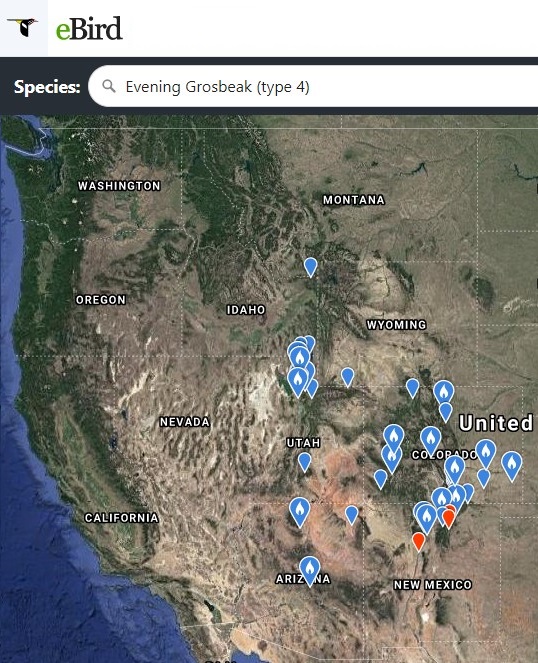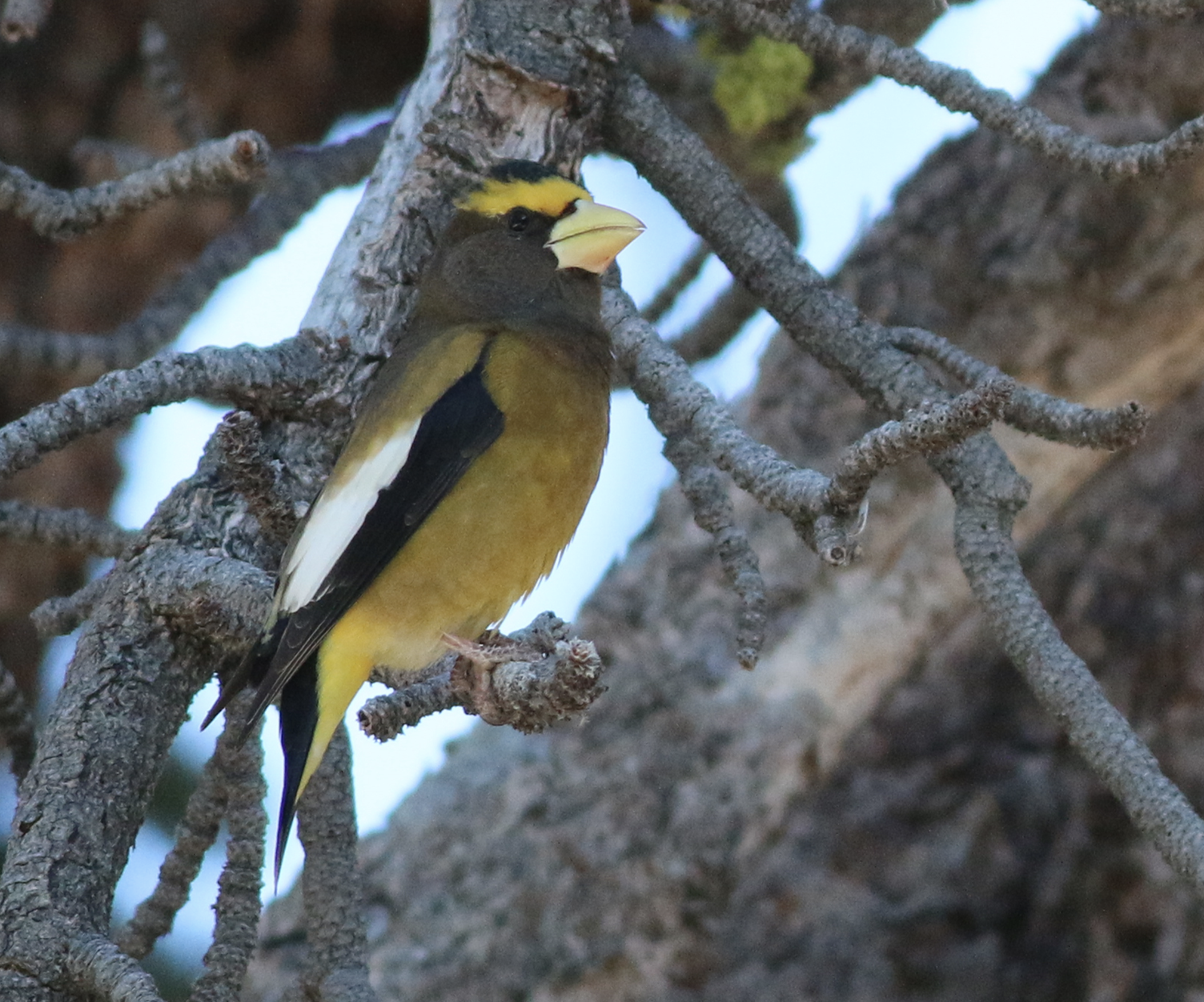Irruption Alert: The Irruptive Type 1 Evening Grosbeak of the West: By Matthew J. and Silvester Williams; Photos by Silvester Williams.
The predicted Type 3 Evening Grosbeak irruption in the eastern US is going on NOW! But what about the West? There is some compelling evidence that it may be happening out here too but it’s a little more subtle than Evebeaks showing up where they are typically absent. The western irruptive is Type 1, but we desperately need better data (especially audio recordings) through the winter and into the breeding season to determine whether Evening Grosbeak reports are made up of a high number of the irruptive Type 1 (https://macaulaylibrary.org/asset/105759) or the more local Type 4 (https://macaulaylibrary.org/asset/130769). For more on the five Evening Grosbeak Call Types: https://finchnetwork.org/species/grosbeaks/the-evening-grosbeak-project

Type 1 Evening Grosbeak map (from eBird.org)

Type 4 Evening Grosbeak map (from eBird.org)
One recent sighting, complete with photos and audio, of a Type 1 Evening Grosbeak in the Texas Panhandle (1st state record), strongly suggests that there is strong movement of Type 1 grosbeaks.
Another sighting with the important audio documentation puts a Type 1 in the Chiricahuas of SE Arizona (southeasternmost record and nearly in Mexico!). The habitat here is good for grosbeaks, but a Type 1 this far south is extremely rare. Be on the lookout for the elusive Type 5 Evening Grosbeak in the Chiricahuas as well! If you encounter any Evening Grosbeaks in the Chiricahuas, please try to grab a recording.
While there was certainly some movement of Type 1 last year, the extent of these wanderings so early in this 2020 season strongly suggests that an interesting story will play out in Winter 2020-21 for Evening Grosbeaks across the nation.
So, keep your Black Oil Sunflower seed supplies stocked up and your platform and hopper feeders filled. Also, have your phone or other recording equipment handy. Maybe even set something up outside or at your feeders (like a sound triggered mic or a hunting camera) to record Evening Grosbeaks or any other fascinating finds in your yard.
Submit your sightings to eBird (including type and audio) to help answer some nagging questions:
- To what extent will Type 1’s irrupt this year? Distance? Quantity?
- Are Type 1 and Type 4 geographically isolated during the breeding season?
- Do they overlap in parts of their range but only breed with the same type?
- What other, more complex things may be happening on the breeding and wintering grounds?
- Do Types 1 and 4 form mixed flocks during the winter
As winter finches go, the Evening Grosbeak is perhaps the most gorgeous of all, and we hope that wherever you may live, that many of you are lucky enough to enjoy them at your feeder during this winter!
FiRN is a nonprofit, and has been granted 501c3 status. FiRN is committed to researching and protecting these birds and other threatened finch species like the Evening Grosbeak and Rosy-finches, and if you have been enjoying all the blogs and identifying of Red Crossbill call types, redpoll subspecies and green morph Pine Siskins FiRN has helped with, please think about supporting our efforts and making a small donation at the donate link below.
Photo Credit at top Lance Benner. See below for more of Silvester’s photos of Evening Grosbeaks, and another species to stay tuned about, Cassin’s Finch.
About the Authors:
Matthew Williams is dad to Silvester and 3 others and husband to a supportive wife who spots most of the good birds for us. They live in Heber City, UT (near Park City). He grew up in Western Massachusetts, and got deep into birding during his time at Cornell where he studied Environmental Engineering and was one of the “Matts”. His most memorable western Evening Grosbeak sightings include a small flock near Walnut Creek,CA and one probable Type 5 from the Huachuca Mtns. in AZ (no audio!).
Silvester Williams (13) is an avid birdwatcher, eagle scout, mountain biker, XC skiier and photographer. He got his first eBird account when he was 7, and continues to grow his life list, now at 334. One of his greatest birding achievements was creating a Maryland yard list (in 3 years) with 120 species including Purple Finches and Siskins…but no Evening Grosbeaks!
Below are some photos of a large flock of ~150 Type 1 Evening Grosbeaks in Park City, UT and a few Type 1’s at feeders in Heber City in early spring 2020.

